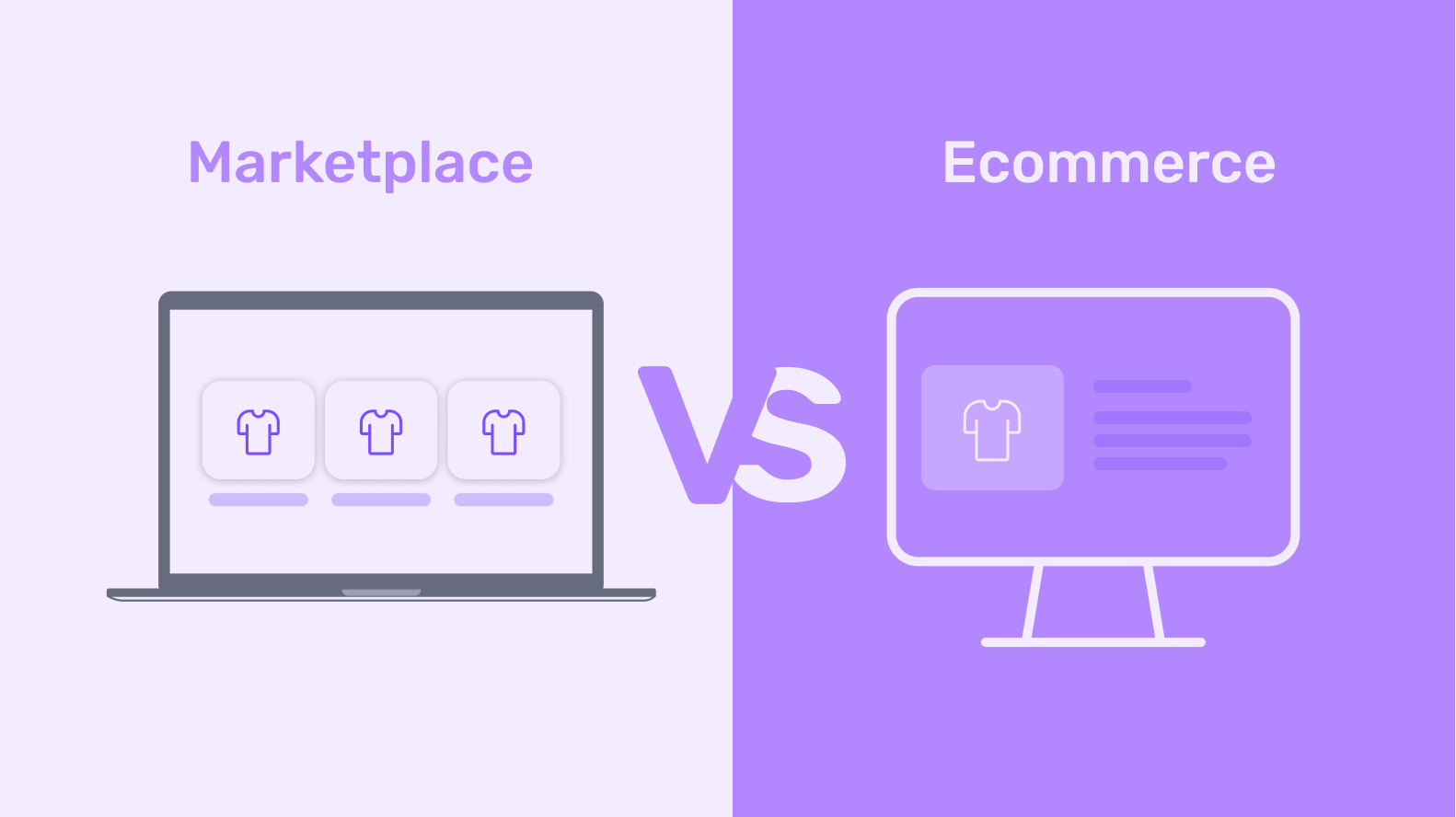Choosing whether to sell on ecommerce marketplaces or build your own ecommerce store is like deciding whether to go on a guided bus tour or hire your own car.
On the tour bus, you get to sit back, relax and enjoy the scenery, but you have to work according to the rules laid out by the tour guide.
In your rented car, you have total freedom when it comes to your schedule and the places you visit, but you have to fix any flat tyres.
In this blog, we’ll break down all of the key pros and cons of online marketplaces and ecommerce stores so you can make an informed decision about the option you pick.
But the truth is, you don’t have to.
In some cases, using these platforms in tandem will drive the best results. Let’s dive in 👇
What is an ecommerce store?
An ecommerce store is a type of online selling platform that allows you to sell your products and services directly to customers. You handle most of your operations yourself, like order management, inventory management and marketing, while you may partner with third parties for things like payment processing and shipping.
Online store builders are a popular way to create these ecommerce stores, which take the form of websites and apps. With an online store builder, you can select:
- A design that reflects your brand
- The ecommerce features you want to build
The most popular ecommerce platforms on the market, like Builder.ai, Shopify and Wix, enable you to build your ecommerce store without any tech knowledge.
Ecommerce platform pros | Ecommerce platform cons |
Complete control over your store | Higher setup costs |
Better margins | Higher marketing costs |
Access to customer data | Takes longer to see results |
Pros of ecommerce store
There are many benefits to having your own ecommerce store, including:
1 - Complete control over your store
With complete control over your store’s design, functionality and tone of voice, you can provide a consistent brand experience. This sets your business up for long-term success by differentiating you from your competitors.
On marketplaces, pricing and reviews are your only currency.
2 - Better margins than marketplaces
Because you don’t have to share your profits, selling on an ecommerce store allows you to improve your margins.
You can also use various strategies to increase your profits, such as up-sell and cross-sell strategies, product recommendations and dynamic pricing. On the other hand, marketplaces recommend similar products to yours, driving business towards your competitors.
3 - Access to customer data
In your ecommerce store, you own customer data, something that’s not possible with marketplaces.
This data enables you to run targeted marketing campaigns, provide discounts and offer personalised customer experiences. As a result of this, you can reduce your customer acquisition cost (CAC) and focus more on more cost-effective retention strategies.
With direct access to data, you can also forecast demand ahead of time and take proactive steps to account for it.
Cons of ecommerce store
Is the ecommerce store a bulletproof solution to digitalising your business? No, they also have downsides, which might turn off some players from opting for them.
1 - Higher setup and maintenance costs
The cost of starting an ecommerce store is higher when compared with marketplace selling.
To build an online store, you’ll have to pay for design, setup, features, third-party integrations and add-on tools.
To run your online store, you’ll also have to pay for your domain name, SSL certificate and hosting services.
And finally, after you’ve launched your online store you’ll also have to pay for its maintenance to keep it running smoothly.
2 - Higher marketing costs
Just because you’re ready to spend on developing your online store, that doesn’t mean you’ll have customers breaking down the door. You have to reach out to your customers rather than wait for them to come to you.
Once you’ve built your ecommerce store, you need to spend money on marketing your ecommerce store and the products you’re selling.
One of the ecommerce marketing strategies that you need to invest in is paid marketing. You should look out for platforms that offer low pay-per-click (PPC) rates and high impressions.
Simultaneously, you need to make sure that your customers can find the products when they search on Google. That’s why you’ll also have to invest in search engine optimization (SEO).
On marketplaces, by contrast, listing your products gives you instant access to potential customers.
3 - Take longer to see results
Owning your own ecommerce store is a longer-term play.
So unless you already have a loyal customer base, it may take a while for you to start generating revenue via your online store.
This is why it can be beneficial to sell via marketplaces initially and then use that money to invest in an ecommerce store.
What is an ecommerce marketplace?
An ecommerce marketplace is a digital platform that connects a diverse range of brands and products with potential customers. They handle many of the logistics involved in running an online store, like order management, payment processing and order fulfilment and typically operate on revenue-sharing models.
Some of the biggest online marketplaces around the world are Amazon, Walmart, Etsy, Alibaba and eBay. In the USA, Amazon alone accounts for 37.6% of all ecommerce sales.
Different types of marketplaces cater to different kinds of niches and markets. You can easily list your products on the marketplace you find most convenient.
Marketplace pros | Marketplace cons |
Large (and instantly accessible) audience | Limited brand control |
Low startup costs | Low margins |
Quick and convenient selling | Difficult to scale |
Pros of selling on marketplaces
There are many advantages to selling on marketplaces 👇
1 - Large (and instantly accessible) audience
There’s no denying the fact that marketplaces attract more customers than individual ecommerce stores. Because of their massive user base and the fact that many marketplaces have an international presence, borders don’t limit your ability to sell.
It’s also fast to access this user base and you can make sales simply by listing products on their sites.
2 - Low startup costs
One of the immediate advantages of selling your products on online marketplaces is that you save time and money on store setup.
You simply need to have the required documentation, which varies from marketplace to marketplace and country to country.
On the other hand, if you build your own ecommerce store, you have to accept short-term pains to achieve long-term gains.
3 - Quick and convenient selling
One of the biggest advantages of selling on marketplaces is the convenience it offers to sellers. With marketplaces, you don’t have to burden yourself with fulfilment and logistics operations.
The majority of marketplaces provide warehousing and fulfilment services. They handle tasks like providing shipping labels, processing payments, generating tracking links and managing returns.
Marketplaces also provide you with convenient features like product catalogues, SEO, dynamic pricing to make your life as easy as possible.
Cons of selling on marketplaces
Before you start selling on marketplaces, you should also be aware of their downsides.
1 - Limited brand control
With marketplaces, you have little to no say in how your brand is showcased. If you’re a new brand on marketplaces, it can be very challenging to build your brand identity because all the focus is on the product and its price.
Marketplaces offer very little for your brand to stand out from the crowd. Whereas with ecommerce store, you have complete control over how your brand is perceived by your customers.
This lack of control over brand identity was a big part of why Nike decided to leave the Amazon marketplace.
2 - Low margins
For every sale you make, marketplaces will take up to 20% in fees.
This is on top of the closing fee, shipping fee, storage fee, pick and pack fee, weight handling fee and more.
With high competition and little room to increase prices, this makes scaling your marketplace store very challenging in the long term.
3 - Difficult to scale
Online marketplaces own the complete customer data and don't give you comprehensive access to it.
Because you don't know who your past customers were, you can’t tell them about your new product offerings or reach out to them during sales and discounts.
What’s more, exclusively selling on marketplaces makes your business highly reliant on infrastructure it can’t control.
For example, a slight tweak to a marketplace algorithm or an update to its terms and conditions could result in your store and its listings becoming invisible. Obviously, this would have disastrous implications for your business and staff.
With ecommerce stores, on the other hand, you can future-proof your business and diversify your revenue streams.
Choose an ecommerce store for | Choose marketplace for |
Brand control and marketing | High customer reach |
High margins | Low initial costs |
Customer data access | Seller convenience |
Ecommerce store vs marketplaces: choosing the right model for you
Now that you’ve weighed the pros and cons of both ecommerce stores and marketplaces, the question remains—which platform is better for you?
To answer this, I want you to consider the following:
Are you a casual seller with limited resources?
If you don’t have the resources to create your own ecommerce store yet and you’re just testing the water with online selling, you should get started on marketplaces.
Although you’ll have lower margins, your startup costs will be far cheaper and all the complicated stuff will be handled for you.
What’s more, you can instantly access a huge market of buyers.
Are you an established brand or experienced marketplace seller?
If you’re an established brick-and-mortar business or an experienced marketplace seller, you know who your target audience is and probably have some loyal customers.
The next step in your business journey is to grow your brand, increase repeat business and improve your bottom line.
Investing in an ecommerce store allows you to do just that, but you could also (continue to) sell on marketplaces while you establish your online presence.
Conclusion
While both platforms allow you to sell your products online, they’re very different when it comes to costs, control and customer relationships.
Only by understanding the pros and cons of both platforms and aligning them with your goals can you select what’s best for your business.
If building an ecommerce store is what you need to do, Builder.ai has you covered.
With Studio Store, you can create your own ecommerce websites and apps in as little as two weeks:
- No coding skills needed
- Free hosting and maintenance
- No revenue sharing or vendor lock-in
Build your ecommerce app by hitting the banner below 👇
Want to build your online store?
Book a demoSpeak with one of our product experts today.
By proceeding you agree to Builder.ai’s privacy policy and terms and conditions

Ananth Ramanathan runs Studio Store business at Builder.ai with a mission of digitising a 1M+ micro SMEs in the next 5 years. He oversees the commercial, product, and customer success functions to rapidly scale Studio Store globally. Ananth's an experienced tech business operator, a failed entrepreneur, and an active angel investor.












 Facebook
Facebook X
X LinkedIn
LinkedIn YouTube
YouTube Instagram
Instagram RSS
RSS


